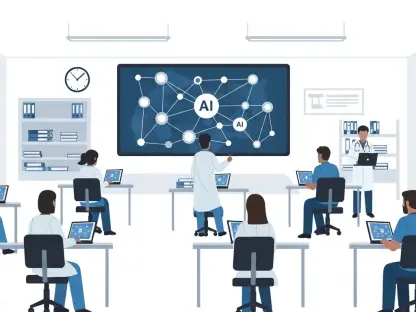The advent of artificial intelligence has significantly altered various sectors, presenting both opportunities and challenges for leadership. At the “Leadership in the Age of AI” forum held at Northwestern State University (NSU), experts discussed AI’s transformative potential, focusing on its application in business, healthcare, and other fields. The insights shared by speakers like Dr. Neilank Jha, Monty Chicola, and Dr. Julian Bailes illuminate the profound impact AI has on modern life and leadership.
AI and Business Leadership
Integrating AI in Decision-Making Processes
AI’s processing power, which operates 120 million times faster than the human brain, offers unprecedented data analysis and decision-making capabilities. Dr. Neilank Jha emphasized that the most effective approach to leveraging AI involves human-AI collaboration. While AI can analyze vast amounts of data swiftly, human oversight ensures ethical and sound outcomes. This synergy between AI and human intelligence is vital for making informed decisions that benefit both businesses and society as a whole.
Business leaders are increasingly turning to AI to optimize operations, enhance customer experiences, and drive innovation. AI-powered tools enable companies to predict market trends, personalize marketing strategies, and automate routine tasks, thereby freeing up human resources for more value-added activities. Monty Chicola, founder of Real Vision Software, highlighted the permanence of AI in commerce and communications, underscoring the importance of leveraging American-developed AI for political and economic stability.
Ethical Considerations in AI Adoption
Despite AI’s remarkable capabilities, ethical considerations remain paramount. The integration of AI into business processes raises questions about data privacy, algorithmic bias, and the potential displacement of jobs. Leaders must navigate these challenges by establishing robust ethical frameworks and regulatory standards. Ensuring transparency in AI algorithms and fostering a culture of continuous learning and adaptation are crucial steps toward responsible AI adoption.
At the forum, speakers agreed that businesses must prioritize human oversight in AI applications to mitigate risks and uphold ethical standards. By doing so, companies can harness the full potential of AI while safeguarding the interests of employees, customers, and society. This balanced approach fosters trust in AI technologies and promotes sustainable growth.
AI’s Impact on Healthcare
Advancements in Medical Diagnostics and Treatment
In the healthcare sector, AI is revolutionizing diagnostics and treatment methodologies. Dr. Julian Bailes explored AI’s applications in neurosurgery, highlighting advanced GPS technology and imaging tools that enhance surgical precision. AI enables real-time analysis of complex medical data, allowing surgeons to make informed decisions during procedures. This technological advancement not only improves patient outcomes but also reduces the risk of complications.
AI-powered diagnostic tools are transforming the way healthcare professionals detect and manage diseases. Machine learning algorithms can analyze medical images, identify patterns, and detect anomalies with high accuracy. This capability is particularly valuable in early diagnosis of conditions like cancer, where timely intervention can save lives. By integrating AI into diagnostic processes, healthcare providers can offer more accurate, efficient, and personalized care to patients.
Enhancing Patient Care and Outcomes
Beyond diagnostics, AI is playing a pivotal role in enhancing patient care and managing chronic conditions. AI-driven platforms can monitor patients’ vital signs, track disease progression, and recommend personalized treatment plans. Dr. Bailes underscored AI’s potential to enable living diagnoses of brain conditions, allowing for proactive management and improved patient outcomes. This approach shifts the focus from reactive to preventive healthcare, ultimately leading to better quality of life for patients.
The integration of AI in healthcare also extends to telemedicine and remote patient monitoring. AI-powered chatbots and virtual assistants provide patients with 24/7 access to medical advice, reducing the burden on healthcare facilities and improving patient engagement. Additionally, AI algorithms can analyze patient data from wearable devices, offering real-time insights to healthcare providers. These advancements underscore AI’s potential to transform healthcare delivery and make it more accessible and efficient.
AI in Academia and Research
Initiatives to Integrate AI in Education
Northwestern State University’s commitment to integrating AI into academic and research programs reflects the broader trend of embracing AI in education. The forum marked the inauguration of the Lola Walker Dunahoe Lecture Series and the establishment of the Lola Walker Dunahoe Endowed Chair in Interdisciplinary Studies. Dr. Neilank Jha, named the Distinguished Professor in Leadership and Neuroeconomics, plans to collaborate with the NSU School of Business on AI-driven consulting projects to address regional business challenges.
AI’s role in education extends beyond research initiatives. Educational institutions are leveraging AI to enhance learning experiences and improve administrative efficiency. AI-powered tools can personalize learning paths, providing students with tailored resources and feedback based on their individual needs. This approach fosters a more inclusive and engaging learning environment, enabling students to achieve their full potential.
Research and Collaboration for AI Advancement
Collaboration between academia and industry is crucial for advancing AI research and development. NSU’s initiative to attract top talent in interdisciplinary studies aims to foster a vibrant research ecosystem. By bringing together experts from diverse fields, the university seeks to explore innovative AI applications and address real-world challenges. This collaborative approach ensures that AI research remains relevant and impactful.
The forum’s discussions also highlighted the importance of ethical considerations in AI research. Researchers must prioritize transparency, fairness, and accountability in AI development. By adhering to these principles, academic institutions can contribute to the creation of trustworthy AI systems that align with societal values. This ethical foundation is essential for building public trust in AI technologies and ensuring their responsible use.
Embracing the Future of AI-Driven Leadership
Balancing Technology and Human Judgment
The “Leadership in the Age of AI” forum underscored the transformative power of AI across various sectors and the importance of human-AI collaboration. As AI continues to evolve, leaders in business, healthcare, and academia must strike a balance between leveraging technological advancements and maintaining human oversight. This approach ensures that AI solutions are ethical, transparent, and aligned with societal values.
Speakers at the forum agreed that human judgment remains indispensable in guiding AI applications. While AI can process vast amounts of data and identify patterns, it lacks the nuanced understanding and empathy that humans bring to decision-making. By combining the strengths of AI and human intelligence, leaders can make more informed, ethical, and impactful decisions. This collaborative approach is essential for navigating the complexities of the modern world.
Future Considerations and Actionable Steps
The advent of artificial intelligence has significantly transformed numerous sectors, offering both new opportunities and fresh challenges for leadership. This topic was at the forefront at the “Leadership in the Age of AI” forum held at Northwestern State University (NSU). During the forum, experts delved into the extensive potential of AI, particularly its application in various fields such as business, healthcare, and more. Notable speakers, including Dr. Neilank Jha, Monty Chicola, and Dr. Julian Bailes, shared their insights, highlighting the profound impact AI has on contemporary life and leadership. This event underscored how AI is reshaping our world, emphasizing the need for adaptive and forward-thinking leadership to harness its benefits and navigate its complexities. As AI continues to evolve, leaders must stay informed and agile to effectively guide their organizations through this technological revolution.









